GreenAir’s roundup of the latest news and comment from around the world

First Saudi SAF supplies go to sustainable tourism gateway Red Sea International Airport
28 February 2025
The first supplies of sustainable aviation fuel in Saudi Arabia will go to Red Sea International Airport, gateway to a major new sustainable tourism project being developed as part of the national government’s $3 trillion 2030 economic plan. The fuel, produced with used cooking oil, will be provided by the airport’s fuel supplier, Arabian Petroleum Supply Company (Apsco). While use of the SAF will be optional for visiting airlines, the resort-based seaplane operator Fly Red Sea will use renewable energy including SAF and low carbon aviation fuels (LCAF) to power its growing fleet of Cessna Caravan commuter planes. But demand for the fuel is expected to increase substantially as the development expands from five resorts currently to 50 by 2030, which the state-owned developer Red Sea Global expects to support with a growing range of direct international air services.

United Airlines’ sustainable venture fund makes investment in DAC company Heirloom
28 February 2025
United Airlines Ventures’ Sustainable Flight Fund has made an investment in direct air capture (DAC) company Heirloom, which is already operating North America’s first commercial DAC facility in Tracy, California. The Fund has also entered into an agreement with Heirloom for the right to purchase up to 500,000 tons of carbon dioxide removal (CDR), to be delivered for the production of sustainable aviation fuel or permanently stored underground. Heirloom’s proven and scalable technology accelerates the natural power of limestone to capture CO2 directly from the air, making it potentially one of the lowest cost pathways for removing carbon dioxide, says United. This is United’s third carbon capture investment but the first in a company commercialising DAC technology.

Aviation likely to be the UK’s leading emitter by 2040, forecasts Climate Change Committee
26 February 2025
The Climate Change Committee, which advises the UK government on tackling climate change and proposes the pathway for the nation to achieve net zero emissions by 2050, has published its Seventh Carbon Budget (CB7) that covers the period 2038-2042. As other industries decarbonise faster, aviation will move from being the sixth highest emitting sector to the become the highest, alongside agriculture, during the carbon budget period, with a 27% share of total UK emissions. The Committee foresees aviation contributing to a 5% share of total UK emissions reduction through a gradual increase in the use of sustainable aviation fuels, a growing portion of this coming from synthetic fuels, and demand growth management by ensuring the cost of decarbonising the sector is reflected in the price of flying. During this period, engineered carbon removals are expected to be deployed at scale.

European aviation stakeholders urge priority policy support for e-SAF in Clean Industrial Deal
21 February 2025
With the European Commission due to unveil on February 26 its Clean Industrial Deal, a strategy to boost the EU’s energy-intensive industries and emerging clean-tech sectors, aviation stakeholders that include airlines, airports, fuel producers and NGOs have urged priority support by the Commission for domestic production of e-SAF. The Project SkyPower coalition, which is supported by more than 70 companies and organisations, has written an open letter to European policymakers outlining five key policy interventions to help kick-start an e-SAF industry. While around two million tonnes of e-SAF production capacity from 30 large-scale e-SAF projects have been announced in Europe, no final investment decisions (FIDs) have been reached on any. EU Sustainable Transport Commissioner Apostolos Tzitzikostas told a T&E event in Brussels that the Commission would look at a pricing support mechanism for e-fuels.

New Spark and Norsk e-SAF projects focus on low-cost renewable energy
18 February 2025
Two emerging European energy companies have announced plans to produce synthetic aviation fuel, or e-SAF, at new manufacturing plants using low-cost renewable power. E-fuels are produced by combining water and renewable electricity to create green hydrogen, which is then blended with captured CO2 to create low carbon fuel. However, the high cost of renewable energy in many locations makes this fuel extremely expensive. In Germany, Spark e-Fuels has just announced a €2.3 million ($2.4m) pre-seed funding round, led by climate-focused investor Nucleus Capital, to progress a pilot e-SAF production plant, using proprietary technology which varies the rate of SAF production based on the availability of cheap renewable power. Following its recent partnership with Boeing, Norwegian company Norsk e-Fuel has joined with strategic German investor Prime Capital and renewable energy company RES to progress Project Alby, a new e-SAF plant in Sweden.

ICAO formalises global investment hub for aviation sustainability and cleaner fuel projects
14 February 2025
The International Civil Aviation Organization (ICAO) has established the Finvest Hub, a global platform to connect aviation sustainability projects with potential public and private investors worldwide. It will facilitate dedicated pathways for funding sustainable aviation fuel production facilities, clean energy infrastructure and other aviation decarbonisation efforts, said ICAO. The UN agency said the Hub will actively engage with governments, financial institutions and private sector stakeholders, and prioritise support for developing countries and states that face challenges in financing decarbonisation projects. The Hub was formalised through a Letter of Intent by ICAO Secretary General Juan Carlos Salazar at this year’s Global Implementation Support Symposium (GISS) in Abu Dhabi.

ICCT urges stricter international CO2 standard for aircraft as fuel efficiency gains stall
17 February 2025
Improvements in commercial aircraft efficiency have stagnated largely due to a sharp decline in the certification of new, more efficient aircraft types, finds a new study by the International Council on Clean Transportation (ICCT). New-type certifications have fallen from a peak of six per year in the late 1990s to less than one per year after 2020, when the international CO2 standard adopted by ICAO took effect. Beyond Boeing’s 777X, manufacturers have not committed to developing additional new aircraft types before 2035, says ICCT, which is calling on ICAO to strengthen the standard or risk aircraft efficiency improvements falling short of their anticipated contribution to meeting the industry’s net zero by 2050 target. The study comes as ICAO’s CAEP technical committee gathers for an important two-week meeting (CAEP/13) starting on February 17 that will consider the standard.

Thales, Amelia and Breakthrough carry out largest-ever live contrail avoidance trial
13 February 2025
French aerospace company Thales, in partnership with airline Amelia and Breakthrough Energy Contrails, has released results from what it claims is one of the world’s largest contrail avoidance live trials, and confirms it will expand the initiative in 2025. Thales’ Flights Footprint solution was tested on Amelia’s route between Paris and Valladolid in Spain during the second half of 2024. The aim was to identify flights that could cause contrails at cruise altitude and modify the flight plan to avoid them. Out of 50 flights, five were selected and a lower flight level was chosen, resulting in saving a total of 20 tonnes of CO2 equivalent, and reducing the climate impact of each flight by up to 40%. As the aircraft were flying less optimally, each flight on average consumed up to an additional 3% in fuel. Thales says it expects to roll out the solution to other airlines in time as EU regulatory action on aviation’s non-CO2 climate impact takes effect.

Sustainable aviation financier SkiesFifty invests in US waste-to-SAF venture and ocean carbon removals
12 February 2025
Sustainable aviation investment company SkiesFifty is to partner with Frontline BioEnergy to advance commercialisation of the latter’s proprietary and patented gasification technology that converts biomass and waste into clean renewable fuels, including sustainable aviation fuel. They will jointly own and invest in a new company that will focus on scaling up SAF production in sites across the US and potentially globally. SkiesFifty has also agreed to purchase 200,000 carbon credits over four years through a strategic investment in marine-based carbon removal company Gigablue, which is aiming to permanently remove a gigaton of carbon dioxide by 2035. Over the past year, SkiesFifty has also invested in sewage-to-SAF startup Firefly and teamed with Catalsys to develop green power solutions for aviation ground operations.

Fabrum teams with Christchurch Airport in New Zealand to launch hydrogen testing facility
11 February 2025
New Zealand clean energy technology company Fabrum has unveiled a hydrogen testing facility in partnership with Christchurch Airport (CIAL) to support the development of green hydrogen-powered technologies, primarily in aviation. The partnership will see a test site established as part of CIAL’s Kowhai Park renewable energy precinct, providing liquid and gaseous hydrogen on demand. Both are partners in a hydrogen consortium with Airbus, Fortescue Future Industries, Air New Zealand and Hiringa Energy, which was established in 2023 to bring zero-emission aviation to the country. Fabrum’s facility will enable the development of liquefiers, gas management systems and boil-off gas management technologies. The facility will provide a critical resource for companies developing liquid hydrogen systems, offering them a dedicated space to test and refine their technologies, said Fabrum Chief Executive Dr Ojas Mahapatra.

Airbus delays its ZEROe hydrogen aircraft as UK CAA expands hydrogen programme
10 February 2025
In a significant setback to ambitions for large-scale hydrogen-powered commercial aircraft, Airbus has reportedly delayed its flagship ZEROe programme, in which it had planned to launch a hydrogen-powered commercial airliner by 2035. According to the Financial Times, the timeframe could be pushed back by between five and 10 years and the budget for the programme has been cut by a quarter. A roadmap just published by the European aviation industry downgraded the contribution of hydrogen aircraft to its Net Zero by 2050 target. A more bullish UK Civil Aviation Authority, on the other hand, has announced it is to expand its Hydrogen Challenge programme, as part of a broader exploration of new opportunities to help decarbonise the nation’s air transport sector, and to help make the UK a leader in hydrogen-powered aviation.

European aviation coalition urges greater support for SAF to achieve EU climate targets
10 February 2025
A coalition of six aviation industry groups has warned of a shortfall in European-made sustainable aviation fuel and an increased dependence on expensive imported supplies without “a concerted policy push” by the EU to support greater and more diverse production. The alliance of airlines, airports and aerospace manufacturers has released a 40-page report produced by global business consultancy ICF to highlight barriers and opportunities for local SAF development. Its recommendations include risk-sharing mechanisms to attract private investments and minimise costs to consumers, capital grants and loan guarantees for advanced SAF facilities, and priority access to fuel feedstocks and renewable power. It also calls for increased flexibility in the ReFuelEU Aviation mandate and EU Emission Trading System (ETS) allowances to simultaneously boost the market’s efficiency and ease volatility.

COMMENTARY: Bridging the Hydrogen and eSAF policy gap in the UK and EU
7 February 2025
This year marks a pivotal moment for aviation as the EU and UK sustainable aviation fuel mandates take effect, requiring jet fuel producers to reduce carbon emissions by blending SAF into their fuel. With this, the need to secure hydrogen feedstocks has become necessary for the sector. Although hydrogen is often discussed as a direct aviation fuel, significant progress is also being made in hydrogen-derived eSAF, which features as a key target in both SAF mandates. Despite this legally-binding target, both the EU and UK governments have not outlined how they will support the aviation sector in securing and integrating hydrogen, despite having hydrogen policies published. Misalignment in policies and a lack of clear roadmaps risk putting further strain on the sector, making it increasingly difficult to meet decarbonisation goals, writes Tim Moxham.

Action on Net Zero must accelerate, says industry, as costs of decarbonising European aviation set to soar
7 February 2025
An updated report by European aviation and aerospace industry associations estimates decarbonising the aviation sector in line with a Net Zero by 2050 target will require total expenditures of €2.4 trillion ($2.5 trillion), an increase of €510 billion (27%) from previous estimates. This will largely be driven by higher than previously anticipated market prices for sustainable aviation fuel. Unveiling its second Destination 2050 roadmap report, four years on from the first, European industry leaders said progress towards Net Zero had been promising but urgent action was needed by policymakers to incentivise and drive investment and funding in developing new technologies and, in particular, SAF production and reducing the price premium for alternative aviation fuels. The report says SAF must make up 80% of the fuel mix by 2050, 10% higher than required under the ReFuelEU Aviation regulation.

Avooma Airlines signs hybrid-electric aircraft partner agreement with The AirCraft Company
6 February 2025
UK-based Avooma Airlines has signed a collaboration agreement with The Aircraft Company, an aircraft manufacturer based in Wichita, Kansas, to “explore the opportunity” of utilising the latter’s Pangea family of 30- and 52-seat hybrid-electric regional aircraft, with a decision on potential future fleet investments expected later this year. The family uses ‘electric-first’ and ‘hybrid-on-demand’ principles that allow the aircraft to travel up to 400km using its onboard batteries, and up to 800km using a SAF- and hydrogen-compatible range extender. Avooma says this range would allow it to serve communities throughout the UK, Ireland and several key business centres without any CO2 emissions. Mario Asselin, co-CEO of the The AirCraft Company will join Avooma Airlines’ advisory board. “When establishing Avooma, we pledged to make environmental sustainability one of the three core principles of our business – People, Places and the Planet,” said Chief Vision Officer, Jon Davies. (Photo © The AirCraft Company)

NEWS EXTRA
Hungarian multinational energy and petrochemicals company MOL Group reports that its Slovnaft refinery in Bratislava has successfully produced co-processed SAF from wastes including used cooking oil. It cooperated with the Aeronautics Faculty of the Technical University of Košice in the testing of its SAF. “The test proved that the Bratislava Refinery’s production unit used for the production of standard aviation kerosene is also suitable for producing sustainable aviation fuel,” said MOL.
Spanish energy company Moeve has signed a SAF supply contract with low-cost airline Norwegian. As part of the contract, Norwegian used Moeve SAF for flights from Las Palmas to Nordic countries, primarily Norway and Sweden, as well as Denmark, during the months of November and December 2024. Moeve produces SAF at its La Rábida Energy Park from used cooking oils. It is building a new plant with a flexible production capacity of 0.5 million tonnes of SAF and renewable diesel from 2026.
French clean fuels solutions provider Haffner Energy is to work with LanzaJet and LanzaTech to explore joint biomass-to-SAF projects covering the entire production value chain. They will look at the development of commercial plants, joint technology licences and offtake opportunities as they become available, and funding support and/or investment in specific SAF projects. The partnership will leverage LanzaTech’s and LanzaJet’s CirculAir technology and Haffner’s biomass agnostic technology.
PA Consulting (PA) has signed with Ireland-based SAF ecosystem builder and production accelerator Future Energy Global (FEG) to help compensate for carbon emissions related to PA’s business travel in 2024, which fall under its Scope 3 indirect responsibility. Under the agreement, FEG has retired a tranche of Scope 3 credits derived from airlines’ use of SAF, which falls under an airline’s Scope 1 direct responsibility, as defined under the Greenhouse Gas Protocol.
Topsoe is to provide its HydroFlex technology for a second Chinese SAF project located in the Guangxi Free Trade Zone. The Chuangui New Energy Company plant reached FID in December 2024 and has begun construction, with operations expected to start in December 2026. At full capacity, the plant expects to process 300,000 tons of feedstock into SAF and renewable diesel per year, with Topsoe’s technology enabling an annual emissions avoidance of 800,000 tons of CO2e.
Calumet’s Montana Renewables (MRL) has received the first drawdown of $782 million from its $1.44 billion guaranteed loan facility with the US Department of Energy Loans Program Office. The loan is to fund the construction and expansion of MRL’s renewable fuels facility in Great Falls that will enable an increase in annual production capacity to 300 million gallons of SAF and 330 million gallons of combined SAF and renewable diesel, making it one of the world’s largest SAF producers.


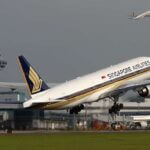
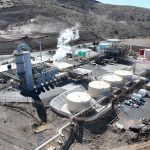
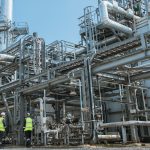
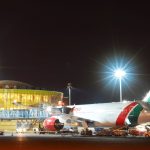
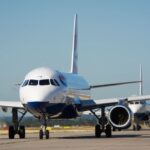
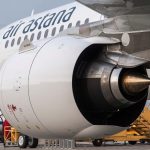

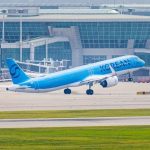





More News & Features
News Roundup October 2025
News Roundup September 2025
News Roundup August 2025
News Roundup July 2025
News Roundup June 2025
News Roundup May 2025